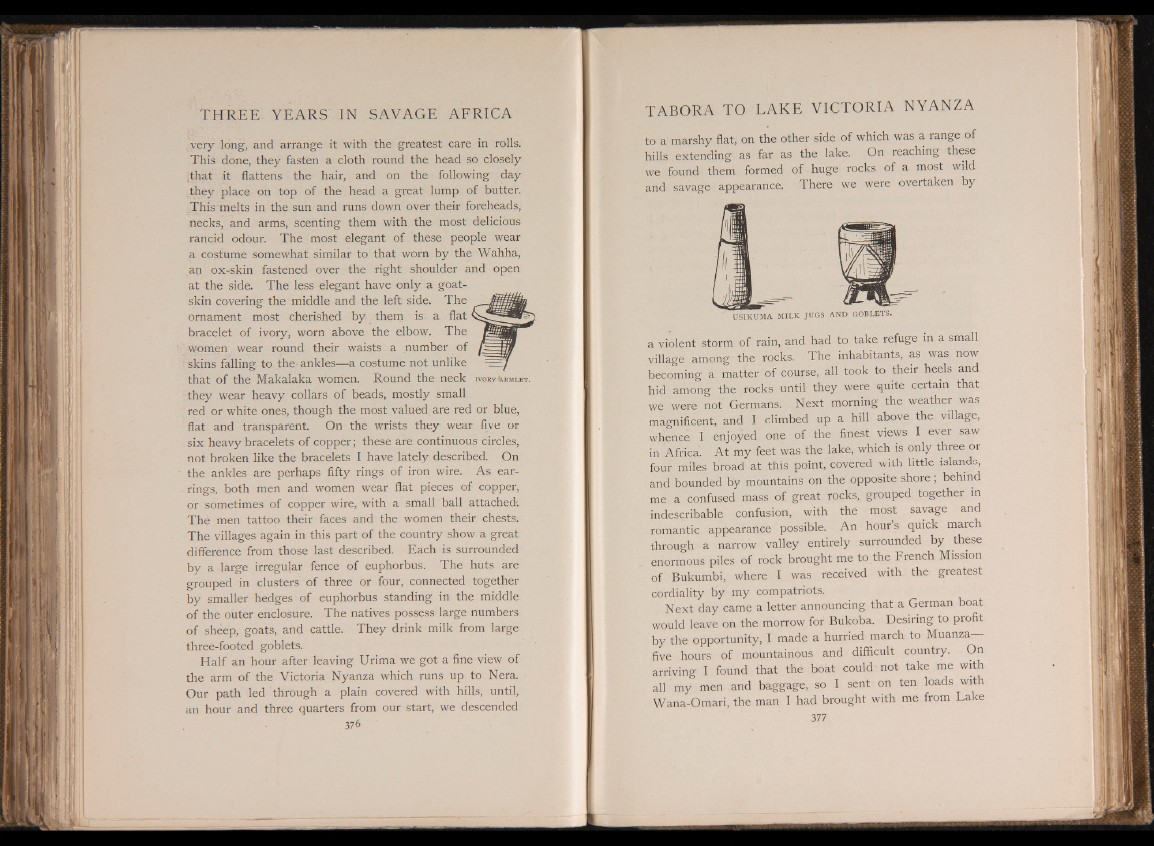
very long, and arrange it with the greatest care in rolls.
This done, they fasten a cloth round the head so closely
that it flattens the hair, and on the following day
they place on top of the head a great lump of butter.
This'melts in the sun and runs down over their foreheads,
necks, and arms, scenting them with the most delicious
rancid odour. The most elegant of these people wear
a costume somewhat similar to that worn by the Wahha,
an ox-skin fastened over the right shoulder and open
at the side. The less elegant have only a goatskin
covering the middle and the left side. The
ornament most cherished by them is a flat
bracelet of ivory, worn above the elbow. The
women wear round their waists a number of
skins falling to the ankles—a costume not unlike
that of the Makalaka women. Round the neck IVORY&RMLBT.
they wear heavy collars of beads, mostly small
red or white ones, though the most valued are red or blue,
flat and transparent. On the wrists they wear five or
six heavy bracelets of copper; these are continuous circles,
not broken like the bracelets I have lately described. On
the ankles are perhaps fifty rings of iron wire. As earrings,
both men and women wear flat pieces of copper,
or sometimes of copper wire, with a small ball attached-.
The men tattoo their faces and the women their chests.
The villages again in this part of the country show a great
difference from those last described. Each is surrounded
by a large irregular fence of euphorbus. The huts are
grouped in clusters of three or four, connected together
by smaller hedges of euphorbus standing in the middle
of the outer enclosure. The natives possess large numbers
of sheep, goats, and cattle. They drink milk from large
three-footed goblets.
Half an hour after leaving Urima we got a fine view of
the arm of the Victoria Nyanza which runs up to Nera.
Our path led through a plain covered with hills, until,
an hour and three quarters from our start, we descended
376
to a marshy flat, on the other side of which was a range of
hills extending as far as the lake. On reaching these
we found them formed of huge rocks of a most wild
and savage appearance. There we were overtaken by
USIKUMA M ILK JUGS AND GOBLETS.
a violent storm of rain, and had to take refuge in a small
village among the rocks. The inhabitants, as was now
becoming a matter of course, all took to their heels and
hid among the rocks until they were quite certain that
we were not Germans. Next morning the weather was
magnificent, and I climbed up a hill above the village,
whence I enjoyed one of the finest views I ever saw
in Africa. At my feet was the lake, which is only three or
four miles btoad at this point, covered with little islands,
and bounded by mountains on the opposite shore; behind
me a confused mass of great rocks, grouped together in
indescribable confusion, with the most savage and
romantic appearance possible. An hours quick march
through a narrow valley entirely surrounded by these
enormous piles of rock brought me to the French Mission
of Bukumbi, where I was received with the greatest
cordiality by my compatriots.
Next day came a letter announcing that a German boat
would leave on the morrow for Bukoba. Desiring to profit
by the opportunity, I made a hurried march to Muanza
five hours of mountainous and difficult country. On
arriving I found that the boat could not take me with
all my men and baggage, so I sent on ten loads with
Wana-Omari, the man I had brought with me from Lake
377